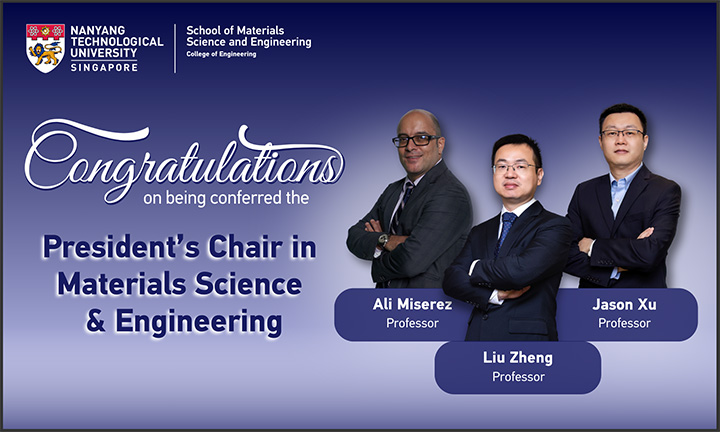MSE Faculty Members Conferred President's Chair Professorships
We are proud to announce the conferment of three distinguished faculty members – Professor Ali Miserez, Professor Jason Xu Zhichuan, and Professor Liu Zheng – as President’s Chair in Materials Science and Engineering. This prestigious honour is a well-deserved recognition of their outstanding contributions and pioneering research.

Professor Ali Miserez: Pioneer in Nature-Inspired Materials Research
Professor Ali Miserez is a pioneer in nature-inspired materials research, seamlessly integrating life sciences with physical sciences to unravel the secrets of biological structures and develop innovative biomimetic materials. His interdisciplinary approach has led to groundbreaking discoveries, such as demonstrating the crucial role of Liquid-Liquid Phase Separation (LLPS) in the biofabrication of hard and fibrous biological materials. Building on this understanding, his team has developed bioinspired phase-separating peptides (PSPs) as intelligent delivery carriers for treating diseases and pioneered a revolutionary drug delivery vehicle capable of delivering a wide range of macromolecular therapeutics directly into cells. Recently, Professor Miserez was awarded the NRF-CRP grant as the Lead PI to apply his PSP delivery technology for the intracellular delivery of antibodies. His research also involves the development of highly efficient anti-fouling coatings to address marine biofouling, as well as seminal studies on ultra-tough bioceramics and biomineralisation. His commitment to sustainability is evident in his work on engineering vegetable proteins into effective water-purification membranes and developing fuel cell membranes from chicken feathers. Professor Miserez’s research has garnered widespread recognition, collaborations, licensing and funding partnerships from leading pharmaceutical and biotechnology companies worldwide, e.g. Promega (US), Astellas (Japan), GeneTech (US), Roche (Switzerland), and TESA (Germany). He was named the World’s Top 2% Scientists in 2023 by Stanford University. Check out Miserez’s Group – Biological and Biomimetic Materials Laboratory (BBML).
Professor Jason Xu: Leader in Electrochemical Catalysis
Professor Jason Xu is a world-renowned electrochemist whose pioneering research has revealed the critical role of geometric occupation of transition metal cations in designing better spinal oxide catalysts for oxygen reduction reaction (ORR) and oxygen evolution reaction (OER). Professor Xu’s work has helped develop more efficient catalysts for sustainable energy applications. He has also pioneered the fundamental understanding of the effects of electron spin and catalyst magnetism on oxygen electrocatalysis, deepening our understanding of spin-polarised OER and paving the way for the development of more efficient ferromagnetic catalysts. Furthermore, his team has unveiled a novel mechanism for sustainable urea production via the electrochemical coupling of nitrite and carbon dioxide on copper surfaces. Beyond research, Professor Xu has made significant contributions to the scientific community by educating young researchers and students in electrochemical measurement and catalyst evaluation protocols. His educational papers and tutorial seminars have contributed to the importance of reliable data in reporting new electrocatalysts for fuel cells and water splitting within the materials research community. His outstanding contributions to the field have earned him numerous awards and honours, including being listed as one of the Highly Cited Researchers by Clarivate Analytics (2018 – 2023) and Top 2% Scientists Worldwide in Nanoscience & Nanotechnology by Stanford University and Elsevier Scopus (2020 – 2023). He has also received the prestigious Zhaowu Tian Prize for Energy Electrochemistry by ISE (2019) and was accorded the Fellow of the Academy of Engineering, Singapore (2022), among other notable recognitions. Check out Xu’s Group – Electrochemical Materials Lab.
Professor Liu Zheng: Innovator in 2D Materials Synthesis and Application
Professor Liu Zheng is a world-renowned researcher in the field of 2D materials synthesis, engineering, and application. His innovative work has led to significant breakthroughs in the creation of novel materials and their implementation in high-performance electronic devices, electrocatalysts, and photocatalysts. Professor Liu's group has developed a groundbreaking synthetic methodology called molten-salt-assisted chemical vapour deposition, which has enabled the creation of a wide range of transition metal dichalcogenide compounds with unique properties. Professor Liu's research has contributed to the development of ultra-low power electronics, mid-infrared detectors, and high-performance catalysts with immense potential applications in clean energy generation and pollution reduction. His interdisciplinary 2D materials research work has garnered significant attention from researchers worldwide, inspiring collaborations that have led to the development of technologies and applications with the potential to positively impact society. Professor Liu is consistently ranked among the Top 1% of the Highly Cited Researchers by Clarivate Analytics (2018 – 2023) and the Top 2% of Scientists Worldwide by Stanford University (2021 - 2023). In recognition of his research achievements, Professor Liu was awarded the prestigious APEC Science Prize for Innovation, Research and Education (ASPIRE) in 2023, making him the first Singapore winner of the prize. His profile and research work have been featured in many local/international media platforms, showcasing the far-reaching implications of his research for society and inspiring the next generation of scientists. Check out Liu’s Group – 2D Materials Lab.
The conferment of Professors Ali Miserez, Jason Xu, and Liu Zheng as President’s Chair in Materials Science and Engineering underscores the University’s commitment to recognising and celebrating excellence in research and innovation. Their pioneering work and dedication to advancing their respective fields serve as an inspiration to MSE and the NTU academic community.







